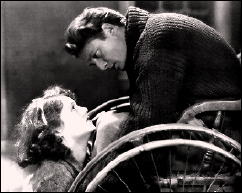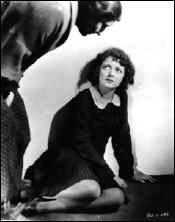Wed 16 Sep 2009
A Movie Review by Walter Albert: LUCKY STAR (1929).
Posted by Steve under Films: Drama/Romance , Reviews , Silent filmsNo Comments
LUCKY STAR. Fox Film Corp., 1929. Charles Farrell, Janet Gaynor, Guinn “Big Boy” Williams, Paul Fix, Hedwig Reicher, Gloria Grey, Hector V. Sarno. Scenario by Sonja Levien; photography by Chester Lyons and William Cooper Smith; art direction by Harry Oliver. (Originally part talkie, but the soundtrack has been lost.) Director: Frank Borzage. Shown at Cinevent 41, Columbus OH, May 2009.

This was one of the films severely compromised by print quality. On its original release, the New York Times reviewer described a film in which “many of the scenes highly resemble etchings — dim portraits of aged shingle houses, with their shutters hanging askew,” and in which muted tones “play a large part.”
Although the print quality left most of these details to the viewer’s imagination, it was apparent that the sets were expressionistic, often angled so that the architecture appeared slightly askew, off-center.
It was clearly a studio (or a stage) set, a grim landscape with the houses widely separated and sparsely populated, a setting appropriate to the film’s minimalist drama, with the look of some remote European village rather than the American town it is supposed to represent.
Timothy Osborn (Charles Farrell) and Martin Wrenn (Guinn Williams) go off to war together and while Wrenn returns to pick up his life where he had left off, Osborn comes back as a cripple who lives by himself in a cottage where he takes on odd jobs to support himself.

Mary Tucker (Janet Gaynor) is the young girl they left behind, now a young woman to whom both men are attracted. Wrenn’s body may be untouched by the war, but his spirit is dark and violent, while Osborn’s bright spirit is undamaged by his experiences.
Mary’s mother, in a telling performance by Hedwig Reicher, wants a better life for her daughter and forbids her to visit Osborn, supporting the suit of Wrenn, who plans to take her away but whose intentions are anything but honorable.
This seems a much smaller film than Borzage’s earlier 7th Heaven and Street Angel, but the director’s handling of his actors is so sure that he makes the !miracles of the spirit he favors in his films believable and touching, even when the darkened print sabotages his intentions.